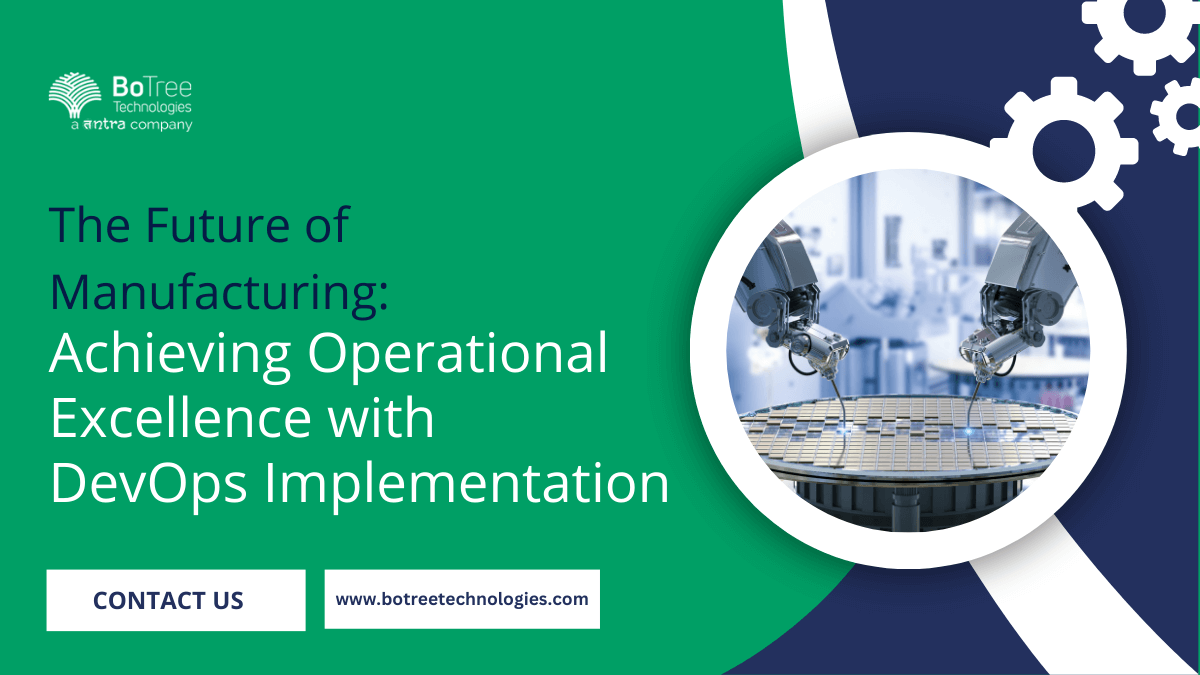
The Future of Manufacturing: Achieving Operational Excellence with DevOps Implementation
DevOps is a methodology for developing software that places a strong emphasis on automation, collaboration, and communication. While DevOps has traditionally been associated with the software industry, it is increasingly being adopted by manufacturing companies to achieve operational excellence. In this article, we will provide an overview of DevOps implementation in manufacturing, discuss the demand for DevOps in the manufacturing sector, and explore DevOps culture’s top components and role in achieving operational excellence. We will also provide best practices for DevOps implementation in manufacturing and discuss how to choose the right software product engineering services for DevOps in Manufacturing.
Overview and Benefits of DevOps in Software Engineering for the Manufacturing Industry
As the manufacturing industry becomes more digitized and data-driven, there is a growing need for software development practices that can keep up with the pace of change. This is where DevOps comes in. DevOps is a collection of methods that integrates software development (Dev) with IT operations (Ops) to shorten the systems development life cycle and offer continual delivery with high software quality. DevOps is based on the Agile methodology, which emphasizes collaboration and flexibility.
DevOps implementation in manufacturing can benefit companies in several ways. Here are some of the benefits of DevOps in manufacturing sector:
- First, it can help accelerate the software development process, allowing manufacturers to bring products to market faster.
- Second, it can improve software quality, reducing the risk of errors and defects that could lead to costly recalls or other problems.
- Third, it can help manufacturers respond more quickly to customer feedback, enabling them to adjust products and processes to meet changing market demands.
Understanding the Demand for DevOps in the Manufacturing Sector
The manufacturing sector is experiencing an increasing demand for DevOps as companies seek agility to bring products to market faster, leverage IoT data for insights, and enhance efficiency while reducing costs. DevOps offers a transformative approach to meet these challenges and drive innovation in the industry. The demand for DevOps in the manufacturing sector is being driven by several factors, such as –
- First, manufacturing companies are under increasing pressure to innovate and bring products to market faster. This requires a more agile approach to software development, one that can keep pace with the rapid changes in the industry.
- Second, the rise of the Internet of Things (IoT) and other New Economy technologies has created new opportunities for manufacturers to gather and analyze data. DevOps can help manufacturers take advantage of these opportunities by providing a framework for developing and deploying software that can handle large volumes of data.
- Third, manufacturers increasingly seek ways to improve efficiency and reduce costs. DevOps can help achieve these goals by automating manual processes and reducing the risk of errors.
Embracing DevOps practices enables manufacturers to thrive in a rapidly changing landscape, unlocking innovation, efficiency, and competitive advantage. Contact software product engineering services like BoTree Technologies today to learn more.
Key Components in DevOps Culture
DevOps implementation in manufacturing consists of three key components: culture, processes, and tools. While all three components are essential, the cultural aspect holds particular significance. DevOps culture emphasizes collaboration, communication, and a focus on continuous improvement. It fosters an environment where teams work seamlessly to solve problems and take ownership of their work.
The cultural component of DevOps involves breaking down silos and fostering a sense of shared responsibility. It encourages collaboration between development, operations, and other teams involved in the software development lifecycle. By promoting open communication and shared goals, DevOps culture enables teams to work together, leading to faster and more efficient development processes.
The processes component of DevOps involves adopting Agile methodologies and other techniques to streamline software development and deployment. Agile methodologies, such as Scrum or Kanban, promote iterative development, frequent feedback loops, and continuous delivery. These processes enable manufacturers to respond quickly to market demands, identify and address issues early on, and deliver software updates more frequently.
The tools component of DevOps encompasses the automation tools, testing tools, and other software products that facilitate the development and deployment processes. These tools automate repetitive tasks, enable efficient collaboration, and ensure software quality through continuous integration and automated testing. By utilizing appropriate tools, manufacturers can accelerate software development, reduce errors, and improve overall efficiency.
Role of DevOps Culture in Achieving Operational Excellence
The role of DevOps culture in achieving operational excellence cannot be overstated. A strong DevOps culture sets the foundation for successfully implementing processes and tools. It encourages a mindset of continuous improvement, where teams are empowered to experiment, learns from failures, and iterate on their work. This culture of learning and adaptation enables manufacturers to achieve faster time to market, deliver higher-quality software, and ultimately enhance customer satisfaction.
Furthermore, a DevOps culture creates a more engaged and motivated workforce. Employees feel empowered to take ownership of their work and contribute to the company’s success. By fostering collaboration and trust, DevOps culture improves team morale, encourages knowledge sharing, and enhances the organization’s overall productivity.
DevOps culture plays a vital role in achieving operational excellence in manufacturing. It establishes the necessary mindset and values for effective collaboration and continuous improvement. When combined with streamlined processes and appropriate tools, DevOps culture enables manufacturers to optimize their software development and deployment, resulting in faster time to market, improved software quality, and increased customer satisfaction.
DevOps Implementation in Manufacturing – 5 Best Practices
DevOps adoption in software development for the manufacturing industry is still in its early stages, but it is growing rapidly. Many manufacturers are starting to embrace DevOps to stay competitive in a rapidly changing industry. However, there are still some challenges to overcome. One of the biggest challenges is the need for cultural change. DevOps requires a shift in mindset from a traditional, siloed approach to software development to a more collaborative and integrated approach. This can be difficult for some organizations to achieve.
Therefore, implementing DevOps in manufacturing requires a strategic approach. Here are five best practices for a DevOps team to consider:
- Start with a clear understanding of your goals. What do you hope to achieve with DevOps? What are your priorities?
- Build a strong DevOps culture. Encourage collaboration, communication, and a focus on continuous improvement.
- Invest in the right tools. Choose DevOps automation tools, testing tools, and other software products that are tailored to the needs of the manufacturing industry.
- Embrace Agile methodologies. Agile methodologies like Scrum and Kanban can help streamline software development and deployment.
- Continuously monitor and improve. Use metrics and analytics to track your progress and identify areas for improvement.
Choosing the Right Software Product Engineering Services for DevOps in Manufacturing
DevOps adoption in software development for the manufacturing industry is gaining momentum, driven by the desire to remain competitive in a dynamic landscape. However, the transition to DevOps is not without its challenges. One major hurdle is the need for a cultural shift within organizations. Moving from a traditional, siloed approach to a more collaborative and integrated mindset requires strong leadership, effective communication, and a shared understanding of the benefits of DevOps.
To successfully implement DevOps in your manufacturing business, you can seek assistance from software engineering companies experienced in DevOps practices. Selecting the right software engineering company is crucial for a smooth and effective implementation. Several factors should be considered during the selection process.
- Firstly, expertise in both software development and operations is essential. The chosen company should deeply understand manufacturing processes and the industry’s specific needs. They should possess the technical skills to build robust software solutions while integrating with existing systems and infrastructure.
- Secondly, the company’s track record and experience implementing DevOps in manufacturing environments should be evaluated. References, case studies, and client testimonials can provide insights into their past projects and success stories.
- The software engineering company should also demonstrate proficiency in using DevOps tools and practices. This includes knowledge of automation tools, continuous integration, and delivery (CI/CD) pipelines, infrastructure as code, and monitoring and analytics.
- Furthermore, effective communication and collaboration are crucial. The selected company should have a transparent and responsive communication process, allowing for regular updates, feedback, and alignment with project goals.
- Lastly, considering the company’s cultural fit with the manufacturing organization is essential. Compatibility in values, work ethic, and collaborative mindset can contribute to a successful and productive partnership.
By carefully evaluating these factors, manufacturers can choose a software engineering company that aligns with their specific needs and facilitates a seamless implementation of DevOps practices, enabling them to thrive in a rapidly changing industry.
Conclusion
DevOps implementation in manufacturing is a key driver of operational excellence. By adopting DevOps practices, manufacturers can improve software quality, reduce time to market, and respond more quickly to changing market demands. To succeed with DevOps, manufacturers must embrace a culture of collaboration and continuous improvement, invest in the right tools, and choose the right software product engineering services. With these best practices, manufacturers can achieve operational excellence and stay ahead of the competition.
Are you a manufacturer looking to take a step ahead of the competition? Adopting DevOps methodology could be an answer to your objectives. Contact software development company BoTree Technologies today for advice and support related to DevOps implementation in your manufacturing enterprise.
Get a Free Quote today!!!




